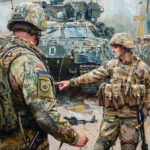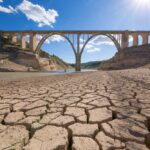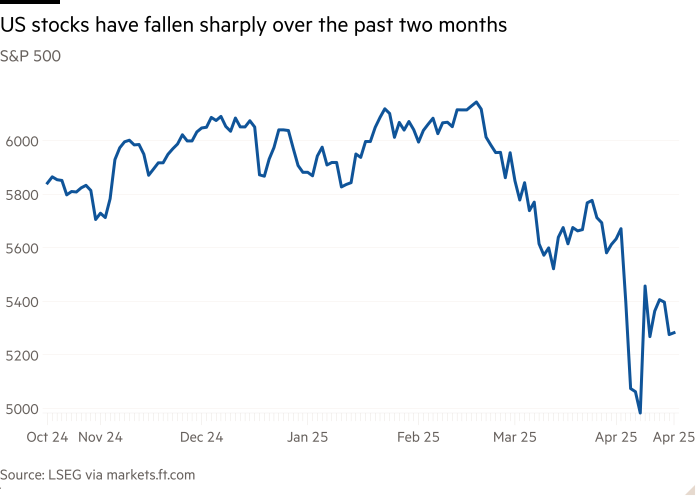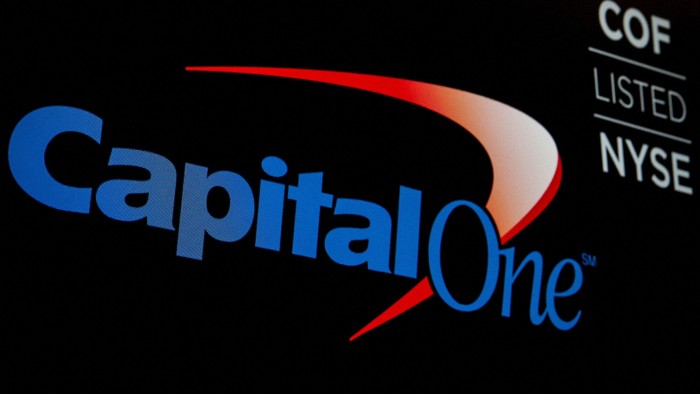Japan set for ‘guinea pig’ trade talks with US after Trump’s tariffs
Unlock the Editor’s Digest for free
Roula Khalaf, Editor of the FT, selects her favourite stories in this weekly newsletter.
Japan’s top trade negotiator has travelled to Washington for the first time since Donald Trump imposed stiff tariffs, starting talks that will set out the US’s demands and give the world wider clues over what is driving the president’s trade war.
Tokyo has been at the head of the queue for talks with US officials on how to stave off the onerous “liberation day” tariffs that Trump has imposed on dozens of nations. The US president announced the levies on April 2 but last week suspended them for 90 days after they triggered market turmoil.
Diplomats said Japan’s status as a “guinea pig” in trade talks might give it an advantage over other countries, but also made it a test case of just how hard the US administration was prepared to hit friends and foes. Japan’s trade surplus with the US is among the 10 biggest in the world.
“All the uncertainty of the last weeks, the weaponisation of tariffs and the language of trade war — in all of this we haven’t properly seen what it is that Trump wants this to lead to,” said a person close to preparations for the talks.
“Japan may not enjoy this position, but its big contribution may be to be in the front line when that is clarified.”
Takeshi Niinami, chair of the Japan Association of Corporate Executives, said the talks would give countries, markets and companies a “showcase” of how the Trump administration would negotiate.
The two-day trip by Ryosei Akazawa, who will holds talks with US Treasury secretary Scott Bessent and US trade representative Jamieson Greer, comes after Japan’s Prime Minister Shigeru Ishiba declared a “national crisis” over the potential hit to trade.
Trump’s imposition of a 24 per cent “reciprocal tariff” on Tokyo has rankled because of Japan’s status as a staunch military ally and the largest foreign investor in the US for the past five years.
Despite Trump’s subsequent pause, Japan still faces a 25 per cent tariff on car exports to the US, as well as the baseline 10 per cent levy imposed on most of America’s trading partners.
Niinami said the choice of Bessent as the lead US negotiator signalled the importance for Washington of pushing Japan to address weakness in the yen, and of the stabilisation of the US Treasuries market, where the Japanese state is a significant participant and holds about $1.1tn as foreign currency reserves.
People familiar with the situation said the US had signalled several priorities for the talks. They include discussing ways for Japan to import more liquefied natural gas; boosting Japanese market access to US produce such as rice and wheat; and addressing different safety standards for cars that Washington believes make it difficult to sell in Japan.
The US Treasury did not respond to a question about the Trump team’s priorities for the talks.
Officials in Tokyo said Japan was prepared to discuss a range of issues, including buying more weapons from the US, infrastructure investment in the US and collaboration on shipbuilding.
In 2019, Japan’s then-prime minister Shinzo Abe — who became known as the “Trump whisperer” for his close rapport with the president — sealed a trade deal with the US in short order, which only managed to ease some restrictions on some US agricultural products and struck an agreement on digital commerce.
Trump described the deal as “phenomenal”, and Abe was able to present it domestically as reassurance of close US-Japan ties.
“We have many cards this time but last time [during the previous Trump administration] was totally different in terms of the scene of negotiations,” said Niinami.
Several experts said Japan would put the US car tariffs high on its priority list.
“Japan will likely focus on trying to get the auto tariffs paused,” said Matt Goodman, a US-Japan economic relations expert at the Council on Foreign Relations. “But the auto tariffs will probably be the hardest thing to get Trump to back down on.”
Tobias Harris, founder of political risk advisory Japan Foresight, said the lack of clarity about the US side’s goals for the talks put Japan and Ishiba in a tight spot compared with the situation under Abe.
“I don’t think there is quick stuff out there. If the US want real concessions on agriculture that is not something that can be settled quickly in the best of times, and this does not feel like the best of times,” said Harris.
“And I don’t get the sense there is a desire in Tokyo to just roll over and do a bad deal for Japan,” he added. “It’s a really tough line for Ishiba to walk. If they do what the US wants there will be a price domestically.”
Jeff Kingston, a US foreign policy expert at Temple University in Japan, said the stakes in the talks were further raised by anxiety in Japan over the US commitment to regional stability in Asia, where it is the primary security player.
Recent actions of the Trump administration, said Kingston and other analysts, have particularly unsettled Japan, which depends on the US for its defence.
In particular, Trump’s stance on Russia’s invasion of Ukraine has raised concerns that the US could be more reluctant to engage militarily in a potential Chinese attack on Taiwan.
At the same time, the Japanese economy’s reliance on exports makes it highly vulnerable to global recessions and any fraying of the international rules-based order.
“The Japanese have to talk tough for domestic consumption, but when it really comes down to it they will do whatever needs to be done to keep Trump on side,” said Kingston. “The difficulty is that Trump uses uncertainty as a weapon in negotiation, and Japan is not in a position to gamble.”








